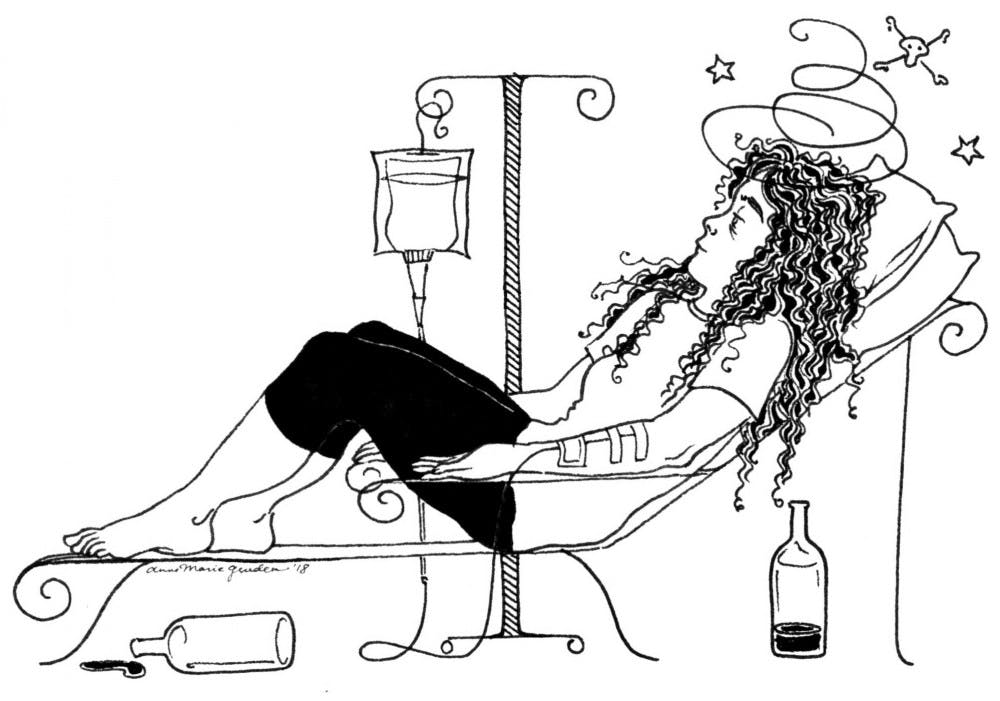Pounding forehead, shaking hands, queasy stomach—the symptoms of an unforgettable night that you might not remember. While some hangovers feel as though they are worth medical attention, the next best thing is a concoction of Pedialyte and Alka–Seltzer to sooth the pain. All over the globe, people have crafted their own hangover cures, from pickle juice in Poland to poutine in Canada. Across history, people have searched to no avail for the absolute cure to their post–alcohol ailment. Now, the newest evolution in hangover remedy has arrived in Philadelphia: intravenous (IV) therapy. But it's nowhere near cheap.
Medical spas like City Hydration, Restore IV, and Enhance IV all specialize in these treatments. At these centers, customers choose from one of several different liquid infusions injected into the bloodstream, delivering benefits of electrolytes, vitamins, and antioxidants. City Hydration, located in Center City, offers a Hangover Relief treatment for $179 and can be administered to healthy patients over 18 years old. “The hangover infusion has been called ‘the hangover cure’ for good reason. This infusion relieves symptoms, headache, body aches, and nausea, almost instantly. There is an anti–nausea medication, pain medication, powerful antioxidant, and b–vitamins that all work together to get you back to your day,” Christie D'Arcy, owner of City Hydration, describes.
In addition to relieving the alcohol shivers, City Hydration offers “drips” for athletic performance ($175), colds ($135), and jet lag ($129). “We see plenty of college students come through our doors, or we make house calls, but not just for the hangover infusion. We have had a lot of students come in when they are run down and just need a boost to get them through late nights of studying and exams. We offer a lot of infusions to help maintain a healthy body and mind. In January, we made several home calls to college students suffering from the flu,” said Christie. For those that are too nauseous to risk the Uber (and the possible vomit cleaning fee), City Hydration’s concierge service is available for $55 for those within a five–mile radius (thankfully, this includes Penn’s campus).
According to City Hydration’s website, registered nurses or paramedics administer the IV while the client can “sip on hot tea, cozy up in a heated blanket, and grab an eye mask” during the 45–minute treatment. As the treatment has not been approved by the FDA, some are skeptical of the health benefits of the IV drip. In fact, the treatment could even be harmful if unsterile needles are used, causing infections. Dr. Stanley Goldfarb, a professor at Penn’s Perelman School of Medicine, spoke out against infusion therapy on UPI.com. "The whole thing is really nonsense," Goldfarb stated. "It's just catering to people's sense that they're taking their health into their own hands."
Former Penn student Gabi Novo (C '15) has tried the IV therapy on two different occasions: Once for a cold and another for a hangover. After both occasions, Gabi felt relief from her symptoms after the IV drip. “Placebo effect or not, but I felt significantly better. I think it is a combination of both. You think you are doing something good for you, and it helps.”
While Gabi does not suggest the “bougie hangover cure” for any occasion, she understands that desperate times call for desperate measures. “It was one of those decisions you made in a hungover haze, and I actually went through with it.” For less severe situations, Gabi recommends just grabbing a bacon, egg, and cheese bagel and a Gatorade to survive a hangover. “I didn’t feel like I hadn’t been drinking, just less hazy.”
Gabi experienced even better results after receiving the treatment while ill. "I was sick with a stomach bug and had been throwing up. I was super dehydrated, but not sick enough for the hospital. One of my nursing friends recommended it. I definitely think it helped me get better."
Besides the expensive price tag, Gabi is hesitant to purchase the treatment again due recent controversy surrounding it. After Hurricane Maria struck Puerto Rico, a major producer of medical supplies, many hospitals across the nation have suffered IV fluid bag shortages since January. “It is sad that people are shelling out for this and the people who need their medicine [from] it are at a disadvantage and a shortage. The people who need it the most should have it, not the people who are willing to pay the most.”
While IV therapy has its advocates and its opponents, there's only one way to find out if IV therapy is the future of hangover cures. For those with the means, try out this cure for yourself. Just be sure you're not scared of needles.

